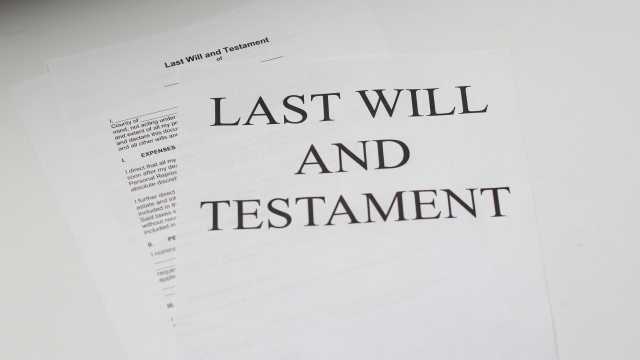Estate Planning
Whatever you own or however much money you have, a will is essential to ensuring that your wishes are carried out after your death. And right now is the best time to create a will to protect yourself, your family, and your legacy.
Annie Sisk
•
Published July 20th, 2022
Table of Contents
Key Takeaways
Just about 60% of U.S. citizens say that they don’t have a will. That number is increasing over time.
A will is essential to ensuring that your wishes are carried out after your death.
Creating a will in 2022 is more simple than ever, with a variety of tools and resources at your fingertips.
Do you have a current will? If not, you’re far from alone. Just about 60% of U.S. citizens say that they don’t have a will either. Moreover, that number is increasing over time.
Whatever you own or however much money you have, or don’t have, a will is essential to ensuring that your wishes are carried out after your death. And right now is the best time to create a will to protect yourself, your family, and your legacy.
While a will that complies with your state’s specific laws and rules can be a complex legal document, don’t be intimidated by the process. As always, you should ideally consult with a trusts and estates lawyer who’s licensed in your area to make sure you’ve complied with all the technical requirements for drafting and executing a valid will. However, you can use this guide to help navigate the decisions you need to make in order to create your will.
Choose an Executor
It might seem odd not to begin the will-drafting process by thinking about what you own and to whom you’d like to leave your assets. In fact, the executor you select will be instrumental in ensuring your belongings and other assets are distributed according to your wishes. The executor’s role is to act as your de facto representative throughout the legal process. Specifically, they’ll be responsible for a variety of important tasks:
- Take inventory of your assets (including bank accounts, real estate, and personal property)
- File copies of your will with the court
- Notify your creditors and deal with their claims against your estate
- Distribute your property according to the will’s terms and the court’s instructions
- Hire and consult with a probate attorney (expect to pay between $3,000 and $7,000 for their services).
As you might expect, this is a demanding position for anyone to fill, especially in the aftermath of the death of a friend or loved one. So it’s worth considering this question carefully. Think of someone who’s responsible, organized, and proactive in responding to problems and questions. Then talk to that person in advance and ask if they’d be willing to serve as your executor. If they agree, make sure you give them a list of all important documents and where to find them. Try to make the process as easy for them as possible.
Decide What to Include in Your Will
Now’s the time to think about all the stuff you own, from personal property to real estate and bank accounts. Some of your property might pass ownership after your death without having to include it in your will. For example, a joint bank account with right of survivorship can pass directly to the joint account holder, and doesn’t need to be accounted for in your will or approved by the court. Life insurance proceeds typically get passed on outside of probate, without specific will provisions.
Other kinds of property will need to be listed if you’d like them to go to a specific person. Cars, jewelry, books, favorite collections you’ve built over the years—if it means something to you and you’d like to make provisions for it to go to a particular person, it’s a good idea to include it in your will.
Make Records of Your Property, Including Debt
Now that you know what you’d like to include in your will, it’s time to get serious about documentation. Create a formal list of all of your property, from those collectibles to your real estate holdings and investments. Gather all the supporting documentation that exists for your property, too, such as deeds and mortgage documents, bank account statements, titles for your vehicles, and other documents that show ownership, value, or debt.
Speaking of debt, don’t forget to catalog what you owe. Credit card accounts and other unsecured debt may not be collectible against your heirs but they can be assessed against your estate’s assets, assuming there’s sufficient value left after paying secured debts (such as car loan balances and other financed purchases).
Choose Your Beneficiaries
This can be the most difficult part of the will drafting process for many people. You know what you have, more or less, and you know how much you owe—but what about the people you want to make specific or general gifts to in your will?
Your will’s provisions can give everything you have to a specific person or people, such as your surviving spouse and your children. However, you can also make specific gifts, or bequests, to named individuals. For example, you can give that baseball card collection directly to your favorite nephew who loves the Yankees as much as you do. Or you can bequeath specific jewelry pieces to your daughter.
Now’s a good time to list out specific gifts you’d like to make, as well as those more general heirs to receive some portion of your assets.
Consider What Will Happen to Your Children
If you have minor children or children who will need additional care after your death, it’s a good idea to make provisions for their care in your will. The court will make its own decision about what’s in your children’s best interests but your wishes will be given every consideration, too. After all, you as the parent know their needs and those interests better than anyone. As with your executor, it’s a good idea to discuss your wishes and plans for your kids with your selected guardians. It’s also important to ask if they’re willing to serve in this capacity before you make those provisions in your will.
Make Sure Your Pets Have a Home
Likewise, it’s important to think about your furry and feathered family members. What will happen to your pets after your death? Perhaps a surviving spouse will take care of them, but what if they can’t or aren’t able to? Consider thinking of a few alternatives and listing them in order of preference. (You can also do this with executors, by the way!)
Change or Update Your Will as Needed
Don’t think that your will is carved in stone. Wills are what we call “living documents.” They can and should change as your circumstances change. This is usually accomplished through what’s called a codicil, or an added set of provisions to your will. Alternatively, you can also redraft your will in its entirety, if that feels more appropriate to you. What life changes should prompt you to update your will? If your children reach the age of maturity, you can delete those provisions for their care and support. If your assets change hands—for example, if you sell your home or some art to fund your retirement plans—then it’s better practice to leave them out of specific gift provisions in your will.
In the same vein, it’s important to account for any new property you’ve acquired, too. If you’ve bought a new or second home, or substantially added to your art collection, you’ll want to account for those items.
Finally, sometimes relationships end and people die. If the people you’ve already designated in your will as either your executor or guardians for your children or as recipients for specific gifts are no longer able to fulfill those functions, make sure you change those provisions accordingly.
Sign Your Will in Front of Witnesses
Each state has its own rules governing how a will must be executed, or signed, in order to be deemed valid by a probate court. In most cases, this procedure requires you to sign the will in front of some number of witnesses. You must also be of sound mind, as the person signing the will, and capable of making informed, independent decisions without being unduly influenced by another person (that is, you must not be under duress).
It’s important to check on your state’s specific rules before you sign your will to ensure you’re signing it in front of the right number and kind of witnesses, with the formalities your state requires. Any codicils you sign in the future and want to add to your will usually also require the same kinds of formalities.
Final Thoughts
Thinking about wills and what happens after you die isn’t anyone’s idea of fun, but it’s one of the most important things you can do to protect your family and loved ones. You can also consult with an experienced local attorney to help ensure the document you draft does what you need it to accomplish.
That’s a good idea especially when your estate is large enough to trigger special tax implications. In 2022, the amount that triggers the federal estate tax is $12,060,000. If your combined estate is worth that much or more, you’ll definitely want to consult with an experienced trusts and estate lawyer and possibly also a tax attorney to help minimize the taxes your heirs will have to pay while remaining completely compliant with applicable laws.
Share this advice
Annie Sisk is a freelance writer and content strategist. Originally from North Carolina, Annie now lives in Binghamton, New York. She's written extensively for finance, legal, and human resources sites and publications, including Legal Beagle and Predictive Index.
Share this advice
Annie Sisk is a freelance writer and content strategist. Originally from North Carolina, Annie now lives in Binghamton, New York. She's written extensively for finance, legal, and human resources sites and publications, including Legal Beagle and Predictive Index.




